Fiduciary Concept in Company and Partnership Law
VerifiedAdded on 2023/06/10
|14
|3723
|481
AI Summary
This article discusses the concept of fiduciary duty in company and partnership law. It explains the nature of fiduciary relationships and duties, and how they apply to corporations and partnerships. It also provides examples of cases and legislation related to fiduciary duty.
Contribute Materials
Your contribution can guide someone’s learning journey. Share your
documents today.

qwertyuiopasdfghjklzxcvbnmqwe
rtyuiopasdfghjklzxcvbnmqwertyu
iopasdfghjklzxcvbnmqwertyuiopa
sdfghjklzxcvbnmqwertyuiopasdfg
hjklzxcvbnmqwertyuiopasdfghjkl
zxcvbnmqwertyuiopasdfghjklzxcv
bnmqwertyuiopasdfghjklzxcvbnm
qwertyuiopasdfghjklzxcvbnmqwe
rtyuiopasdfghjklzxcvbnmqwertyu
iopasdfghjklzxcvbnmqwertyuiopa
sdfghjklzxcvbnmqwertyuiopasdfg
hjklzxcvbnmqwertyuiopasdfghjkl
zxcvbnmqwertyuiopasdfghjklzxcv
bnmqwertyuiopasdfghjklzxcvbnm
qwertyuiopasdfghjklzxcvbnmqwe
rtyuiopasdfghjklzxcvbnmrtyuiopa
Running Head: BUSINESS AND CORPORATION LAW 0
COMPANYLAW
7/23/2018
Student’s Name
rtyuiopasdfghjklzxcvbnmqwertyu
iopasdfghjklzxcvbnmqwertyuiopa
sdfghjklzxcvbnmqwertyuiopasdfg
hjklzxcvbnmqwertyuiopasdfghjkl
zxcvbnmqwertyuiopasdfghjklzxcv
bnmqwertyuiopasdfghjklzxcvbnm
qwertyuiopasdfghjklzxcvbnmqwe
rtyuiopasdfghjklzxcvbnmqwertyu
iopasdfghjklzxcvbnmqwertyuiopa
sdfghjklzxcvbnmqwertyuiopasdfg
hjklzxcvbnmqwertyuiopasdfghjkl
zxcvbnmqwertyuiopasdfghjklzxcv
bnmqwertyuiopasdfghjklzxcvbnm
qwertyuiopasdfghjklzxcvbnmqwe
rtyuiopasdfghjklzxcvbnmrtyuiopa
Running Head: BUSINESS AND CORPORATION LAW 0
COMPANYLAW
7/23/2018
Student’s Name
Secure Best Marks with AI Grader
Need help grading? Try our AI Grader for instant feedback on your assignments.
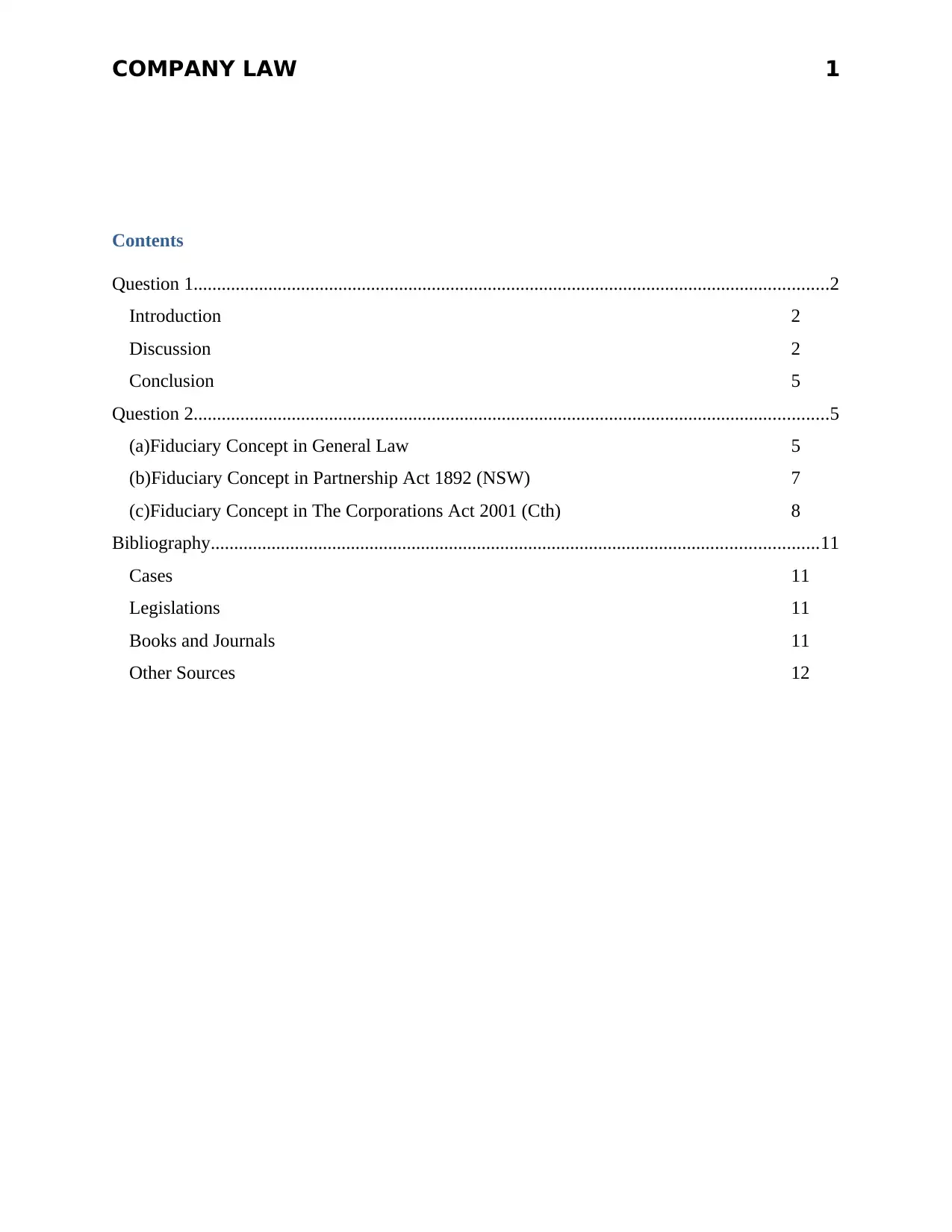
COMPANY LAW 1
Contents
Question 1........................................................................................................................................2
Introduction 2
Discussion 2
Conclusion 5
Question 2........................................................................................................................................5
(a)Fiduciary Concept in General Law 5
(b)Fiduciary Concept in Partnership Act 1892 (NSW) 7
(c)Fiduciary Concept in The Corporations Act 2001 (Cth) 8
Bibliography..................................................................................................................................11
Cases 11
Legislations 11
Books and Journals 11
Other Sources 12
Contents
Question 1........................................................................................................................................2
Introduction 2
Discussion 2
Conclusion 5
Question 2........................................................................................................................................5
(a)Fiduciary Concept in General Law 5
(b)Fiduciary Concept in Partnership Act 1892 (NSW) 7
(c)Fiduciary Concept in The Corporations Act 2001 (Cth) 8
Bibliography..................................................................................................................................11
Cases 11
Legislations 11
Books and Journals 11
Other Sources 12
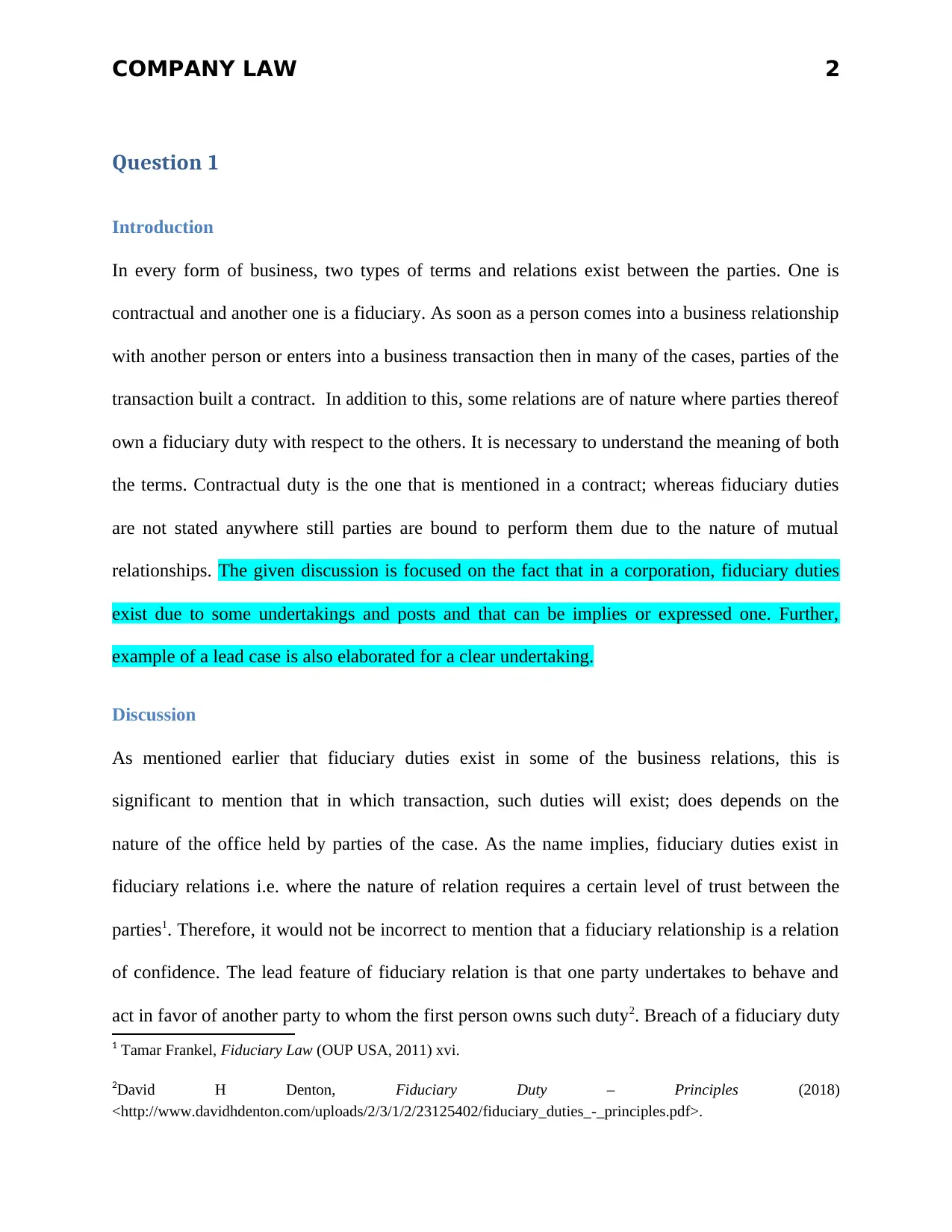
COMPANY LAW 2
Question 1
Introduction
In every form of business, two types of terms and relations exist between the parties. One is
contractual and another one is a fiduciary. As soon as a person comes into a business relationship
with another person or enters into a business transaction then in many of the cases, parties of the
transaction built a contract. In addition to this, some relations are of nature where parties thereof
own a fiduciary duty with respect to the others. It is necessary to understand the meaning of both
the terms. Contractual duty is the one that is mentioned in a contract; whereas fiduciary duties
are not stated anywhere still parties are bound to perform them due to the nature of mutual
relationships. The given discussion is focused on the fact that in a corporation, fiduciary duties
exist due to some undertakings and posts and that can be implies or expressed one. Further,
example of a lead case is also elaborated for a clear undertaking.
Discussion
As mentioned earlier that fiduciary duties exist in some of the business relations, this is
significant to mention that in which transaction, such duties will exist; does depends on the
nature of the office held by parties of the case. As the name implies, fiduciary duties exist in
fiduciary relations i.e. where the nature of relation requires a certain level of trust between the
parties1. Therefore, it would not be incorrect to mention that a fiduciary relationship is a relation
of confidence. The lead feature of fiduciary relation is that one party undertakes to behave and
act in favor of another party to whom the first person owns such duty2. Breach of a fiduciary duty
1 Tamar Frankel, Fiduciary Law (OUP USA, 2011) xvi.
2David H Denton, Fiduciary Duty – Principles (2018)
<http://www.davidhdenton.com/uploads/2/3/1/2/23125402/fiduciary_duties_-_principles.pdf>.
Question 1
Introduction
In every form of business, two types of terms and relations exist between the parties. One is
contractual and another one is a fiduciary. As soon as a person comes into a business relationship
with another person or enters into a business transaction then in many of the cases, parties of the
transaction built a contract. In addition to this, some relations are of nature where parties thereof
own a fiduciary duty with respect to the others. It is necessary to understand the meaning of both
the terms. Contractual duty is the one that is mentioned in a contract; whereas fiduciary duties
are not stated anywhere still parties are bound to perform them due to the nature of mutual
relationships. The given discussion is focused on the fact that in a corporation, fiduciary duties
exist due to some undertakings and posts and that can be implies or expressed one. Further,
example of a lead case is also elaborated for a clear undertaking.
Discussion
As mentioned earlier that fiduciary duties exist in some of the business relations, this is
significant to mention that in which transaction, such duties will exist; does depends on the
nature of the office held by parties of the case. As the name implies, fiduciary duties exist in
fiduciary relations i.e. where the nature of relation requires a certain level of trust between the
parties1. Therefore, it would not be incorrect to mention that a fiduciary relationship is a relation
of confidence. The lead feature of fiduciary relation is that one party undertakes to behave and
act in favor of another party to whom the first person owns such duty2. Breach of a fiduciary duty
1 Tamar Frankel, Fiduciary Law (OUP USA, 2011) xvi.
2David H Denton, Fiduciary Duty – Principles (2018)
<http://www.davidhdenton.com/uploads/2/3/1/2/23125402/fiduciary_duties_-_principles.pdf>.
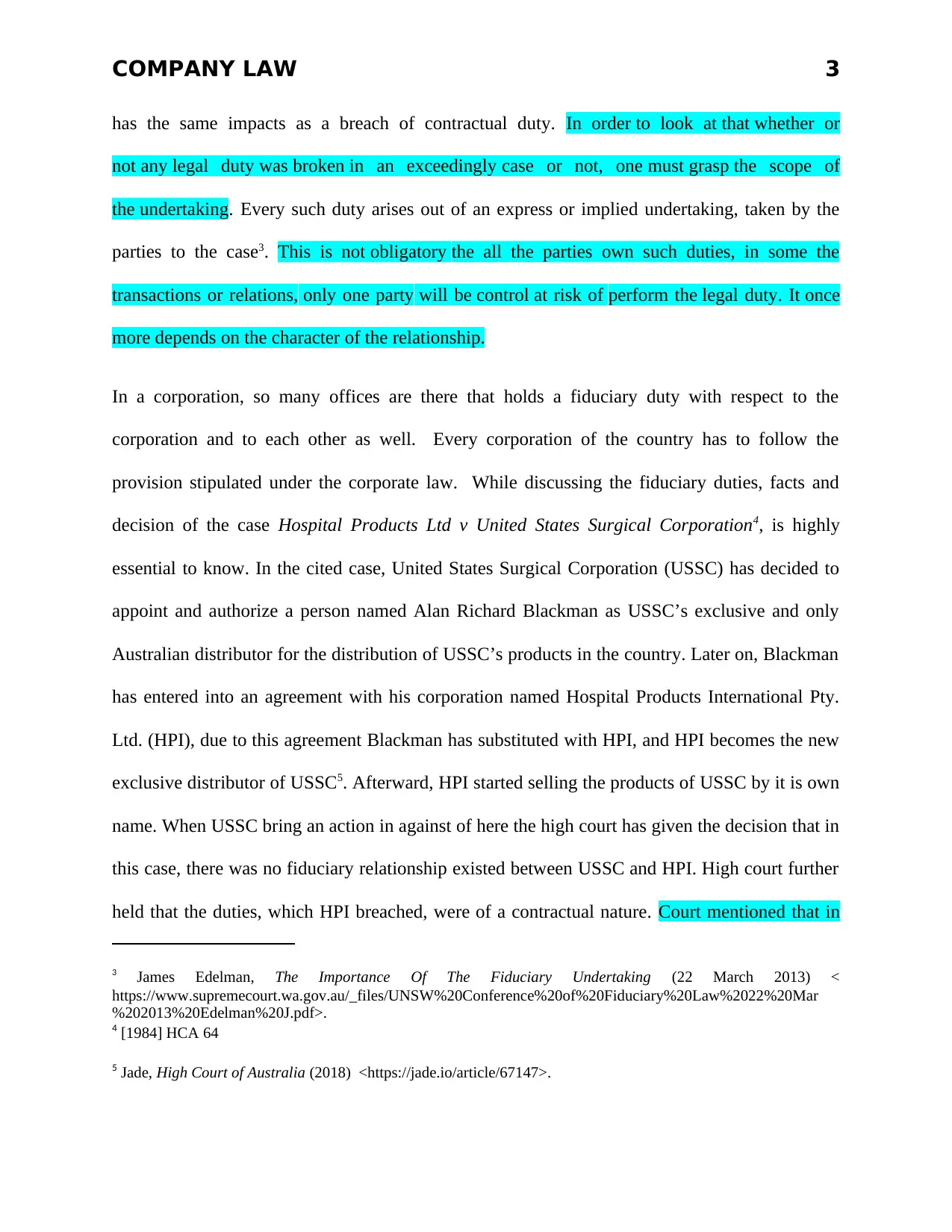
COMPANY LAW 3
has the same impacts as a breach of contractual duty. In order to look at that whether or
not any legal duty was broken in an exceedingly case or not, one must grasp the scope of
the undertaking. Every such duty arises out of an express or implied undertaking, taken by the
parties to the case3. This is not obligatory the all the parties own such duties, in some the
transactions or relations, only one party will be control at risk of perform the legal duty. It once
more depends on the character of the relationship.
In a corporation, so many offices are there that holds a fiduciary duty with respect to the
corporation and to each other as well. Every corporation of the country has to follow the
provision stipulated under the corporate law. While discussing the fiduciary duties, facts and
decision of the case Hospital Products Ltd v United States Surgical Corporation4, is highly
essential to know. In the cited case, United States Surgical Corporation (USSC) has decided to
appoint and authorize a person named Alan Richard Blackman as USSC’s exclusive and only
Australian distributor for the distribution of USSC’s products in the country. Later on, Blackman
has entered into an agreement with his corporation named Hospital Products International Pty.
Ltd. (HPI), due to this agreement Blackman has substituted with HPI, and HPI becomes the new
exclusive distributor of USSC5. Afterward, HPI started selling the products of USSC by it is own
name. When USSC bring an action in against of here the high court has given the decision that in
this case, there was no fiduciary relationship existed between USSC and HPI. High court further
held that the duties, which HPI breached, were of a contractual nature. Court mentioned that in
3 James Edelman, The Importance Of The Fiduciary Undertaking (22 March 2013) <
https://www.supremecourt.wa.gov.au/_files/UNSW%20Conference%20of%20Fiduciary%20Law%2022%20Mar
%202013%20Edelman%20J.pdf>.
4 [1984] HCA 64
5 Jade, High Court of Australia (2018) <https://jade.io/article/67147>.
has the same impacts as a breach of contractual duty. In order to look at that whether or
not any legal duty was broken in an exceedingly case or not, one must grasp the scope of
the undertaking. Every such duty arises out of an express or implied undertaking, taken by the
parties to the case3. This is not obligatory the all the parties own such duties, in some the
transactions or relations, only one party will be control at risk of perform the legal duty. It once
more depends on the character of the relationship.
In a corporation, so many offices are there that holds a fiduciary duty with respect to the
corporation and to each other as well. Every corporation of the country has to follow the
provision stipulated under the corporate law. While discussing the fiduciary duties, facts and
decision of the case Hospital Products Ltd v United States Surgical Corporation4, is highly
essential to know. In the cited case, United States Surgical Corporation (USSC) has decided to
appoint and authorize a person named Alan Richard Blackman as USSC’s exclusive and only
Australian distributor for the distribution of USSC’s products in the country. Later on, Blackman
has entered into an agreement with his corporation named Hospital Products International Pty.
Ltd. (HPI), due to this agreement Blackman has substituted with HPI, and HPI becomes the new
exclusive distributor of USSC5. Afterward, HPI started selling the products of USSC by it is own
name. When USSC bring an action in against of here the high court has given the decision that in
this case, there was no fiduciary relationship existed between USSC and HPI. High court further
held that the duties, which HPI breached, were of a contractual nature. Court mentioned that in
3 James Edelman, The Importance Of The Fiduciary Undertaking (22 March 2013) <
https://www.supremecourt.wa.gov.au/_files/UNSW%20Conference%20of%20Fiduciary%20Law%2022%20Mar
%202013%20Edelman%20J.pdf>.
4 [1984] HCA 64
5 Jade, High Court of Australia (2018) <https://jade.io/article/67147>.
Secure Best Marks with AI Grader
Need help grading? Try our AI Grader for instant feedback on your assignments.
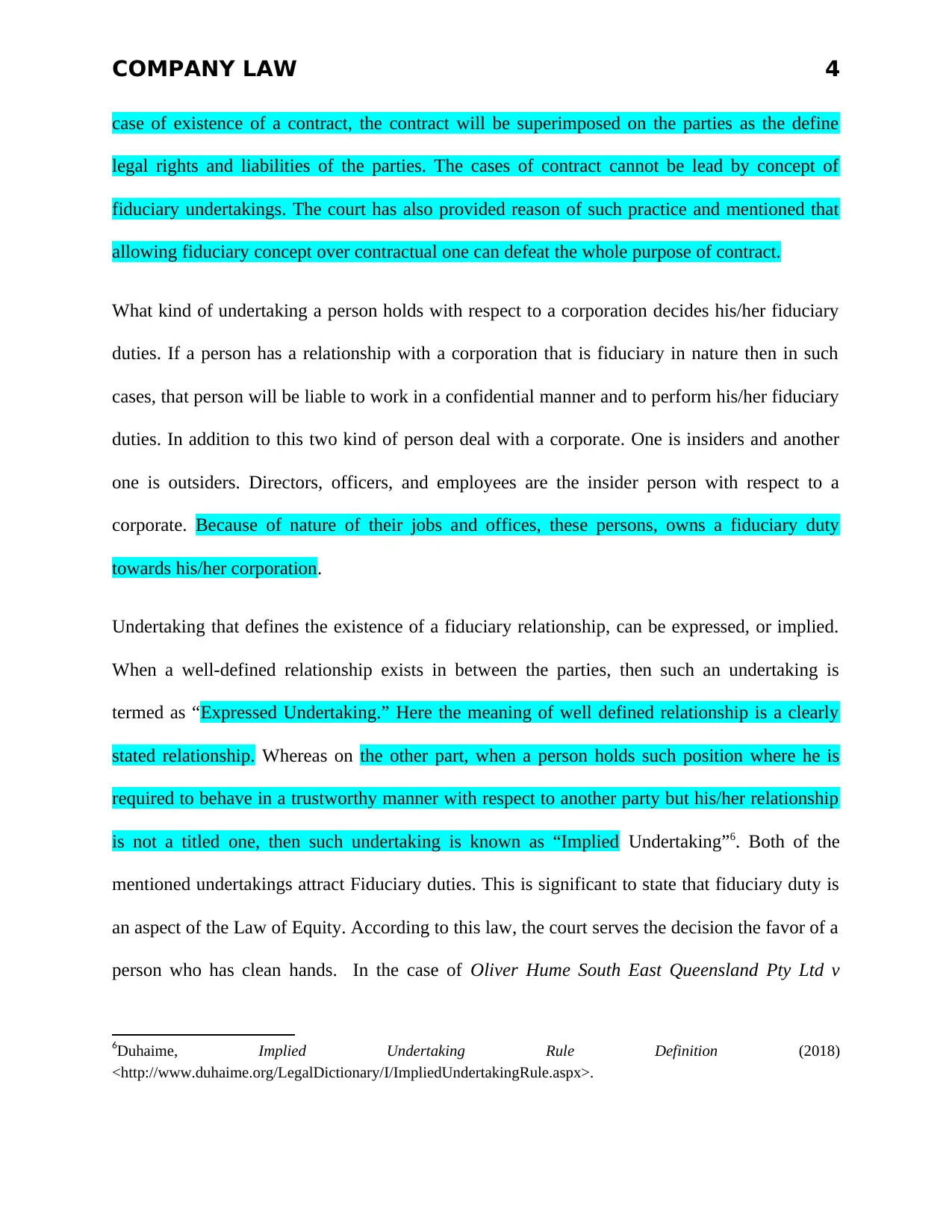
COMPANY LAW 4
case of existence of a contract, the contract will be superimposed on the parties as the define
legal rights and liabilities of the parties. The cases of contract cannot be lead by concept of
fiduciary undertakings. The court has also provided reason of such practice and mentioned that
allowing fiduciary concept over contractual one can defeat the whole purpose of contract.
What kind of undertaking a person holds with respect to a corporation decides his/her fiduciary
duties. If a person has a relationship with a corporation that is fiduciary in nature then in such
cases, that person will be liable to work in a confidential manner and to perform his/her fiduciary
duties. In addition to this two kind of person deal with a corporate. One is insiders and another
one is outsiders. Directors, officers, and employees are the insider person with respect to a
corporate. Because of nature of their jobs and offices, these persons, owns a fiduciary duty
towards his/her corporation.
Undertaking that defines the existence of a fiduciary relationship, can be expressed, or implied.
When a well-defined relationship exists in between the parties, then such an undertaking is
termed as “Expressed Undertaking.” Here the meaning of well defined relationship is a clearly
stated relationship. Whereas on the other part, when a person holds such position where he is
required to behave in a trustworthy manner with respect to another party but his/her relationship
is not a titled one, then such undertaking is known as “Implied Undertaking”6. Both of the
mentioned undertakings attract Fiduciary duties. This is significant to state that fiduciary duty is
an aspect of the Law of Equity. According to this law, the court serves the decision the favor of a
person who has clean hands. In the case of Oliver Hume South East Queensland Pty Ltd v
6Duhaime, Implied Undertaking Rule Definition (2018)
<http://www.duhaime.org/LegalDictionary/I/ImpliedUndertakingRule.aspx>.
case of existence of a contract, the contract will be superimposed on the parties as the define
legal rights and liabilities of the parties. The cases of contract cannot be lead by concept of
fiduciary undertakings. The court has also provided reason of such practice and mentioned that
allowing fiduciary concept over contractual one can defeat the whole purpose of contract.
What kind of undertaking a person holds with respect to a corporation decides his/her fiduciary
duties. If a person has a relationship with a corporation that is fiduciary in nature then in such
cases, that person will be liable to work in a confidential manner and to perform his/her fiduciary
duties. In addition to this two kind of person deal with a corporate. One is insiders and another
one is outsiders. Directors, officers, and employees are the insider person with respect to a
corporate. Because of nature of their jobs and offices, these persons, owns a fiduciary duty
towards his/her corporation.
Undertaking that defines the existence of a fiduciary relationship, can be expressed, or implied.
When a well-defined relationship exists in between the parties, then such an undertaking is
termed as “Expressed Undertaking.” Here the meaning of well defined relationship is a clearly
stated relationship. Whereas on the other part, when a person holds such position where he is
required to behave in a trustworthy manner with respect to another party but his/her relationship
is not a titled one, then such undertaking is known as “Implied Undertaking”6. Both of the
mentioned undertakings attract Fiduciary duties. This is significant to state that fiduciary duty is
an aspect of the Law of Equity. According to this law, the court serves the decision the favor of a
person who has clean hands. In the case of Oliver Hume South East Queensland Pty Ltd v
6Duhaime, Implied Undertaking Rule Definition (2018)
<http://www.duhaime.org/LegalDictionary/I/ImpliedUndertakingRule.aspx>.
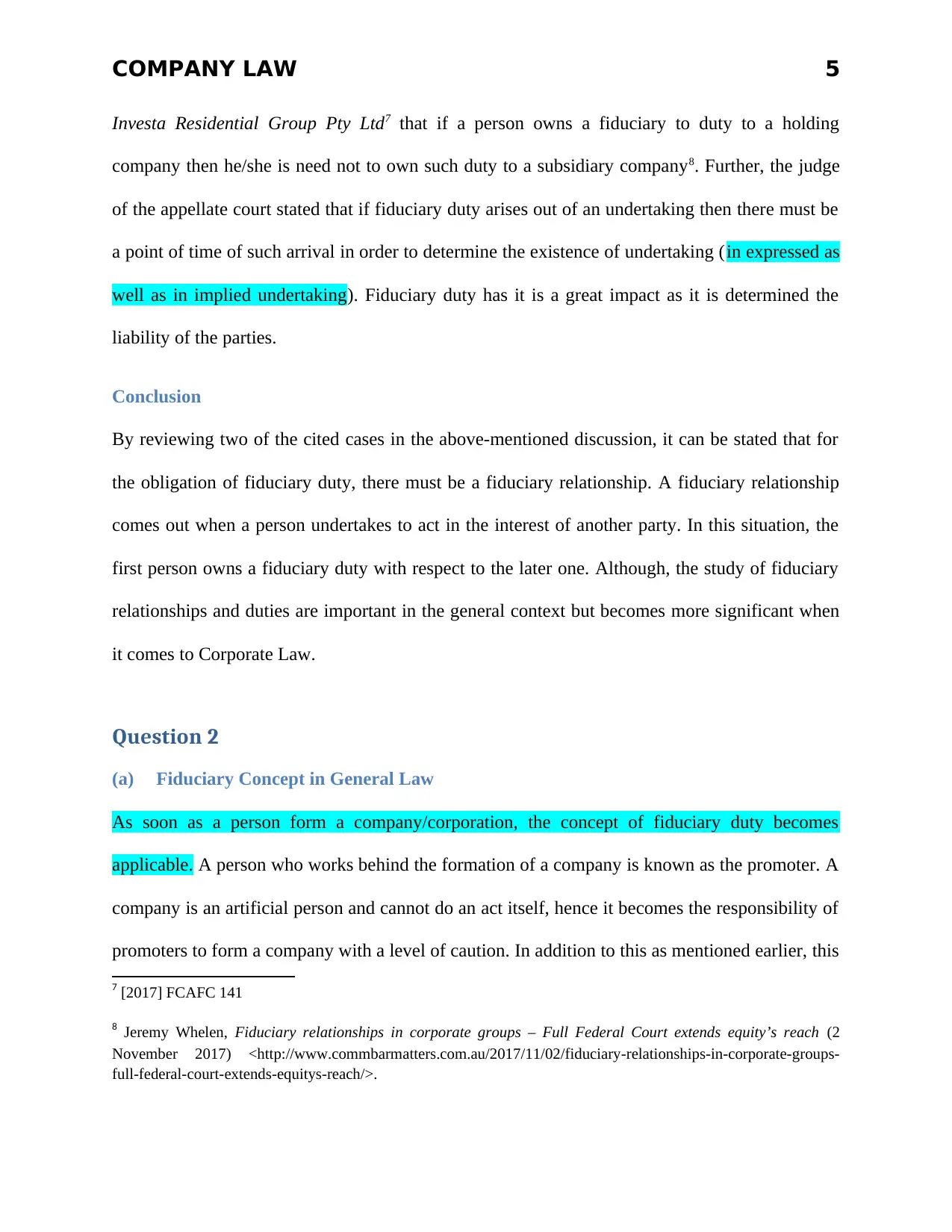
COMPANY LAW 5
Investa Residential Group Pty Ltd7 that if a person owns a fiduciary to duty to a holding
company then he/she is need not to own such duty to a subsidiary company8. Further, the judge
of the appellate court stated that if fiduciary duty arises out of an undertaking then there must be
a point of time of such arrival in order to determine the existence of undertaking (in expressed as
well as in implied undertaking). Fiduciary duty has it is a great impact as it is determined the
liability of the parties.
Conclusion
By reviewing two of the cited cases in the above-mentioned discussion, it can be stated that for
the obligation of fiduciary duty, there must be a fiduciary relationship. A fiduciary relationship
comes out when a person undertakes to act in the interest of another party. In this situation, the
first person owns a fiduciary duty with respect to the later one. Although, the study of fiduciary
relationships and duties are important in the general context but becomes more significant when
it comes to Corporate Law.
Question 2
(a) Fiduciary Concept in General Law
As soon as a person form a company/corporation, the concept of fiduciary duty becomes
applicable. A person who works behind the formation of a company is known as the promoter. A
company is an artificial person and cannot do an act itself, hence it becomes the responsibility of
promoters to form a company with a level of caution. In addition to this as mentioned earlier, this
7 [2017] FCAFC 141
8 Jeremy Whelen, Fiduciary relationships in corporate groups – Full Federal Court extends equity’s reach (2
November 2017) <http://www.commbarmatters.com.au/2017/11/02/fiduciary-relationships-in-corporate-groups-
full-federal-court-extends-equitys-reach/>.
Investa Residential Group Pty Ltd7 that if a person owns a fiduciary to duty to a holding
company then he/she is need not to own such duty to a subsidiary company8. Further, the judge
of the appellate court stated that if fiduciary duty arises out of an undertaking then there must be
a point of time of such arrival in order to determine the existence of undertaking (in expressed as
well as in implied undertaking). Fiduciary duty has it is a great impact as it is determined the
liability of the parties.
Conclusion
By reviewing two of the cited cases in the above-mentioned discussion, it can be stated that for
the obligation of fiduciary duty, there must be a fiduciary relationship. A fiduciary relationship
comes out when a person undertakes to act in the interest of another party. In this situation, the
first person owns a fiduciary duty with respect to the later one. Although, the study of fiduciary
relationships and duties are important in the general context but becomes more significant when
it comes to Corporate Law.
Question 2
(a) Fiduciary Concept in General Law
As soon as a person form a company/corporation, the concept of fiduciary duty becomes
applicable. A person who works behind the formation of a company is known as the promoter. A
company is an artificial person and cannot do an act itself, hence it becomes the responsibility of
promoters to form a company with a level of caution. In addition to this as mentioned earlier, this
7 [2017] FCAFC 141
8 Jeremy Whelen, Fiduciary relationships in corporate groups – Full Federal Court extends equity’s reach (2
November 2017) <http://www.commbarmatters.com.au/2017/11/02/fiduciary-relationships-in-corporate-groups-
full-federal-court-extends-equitys-reach/>.
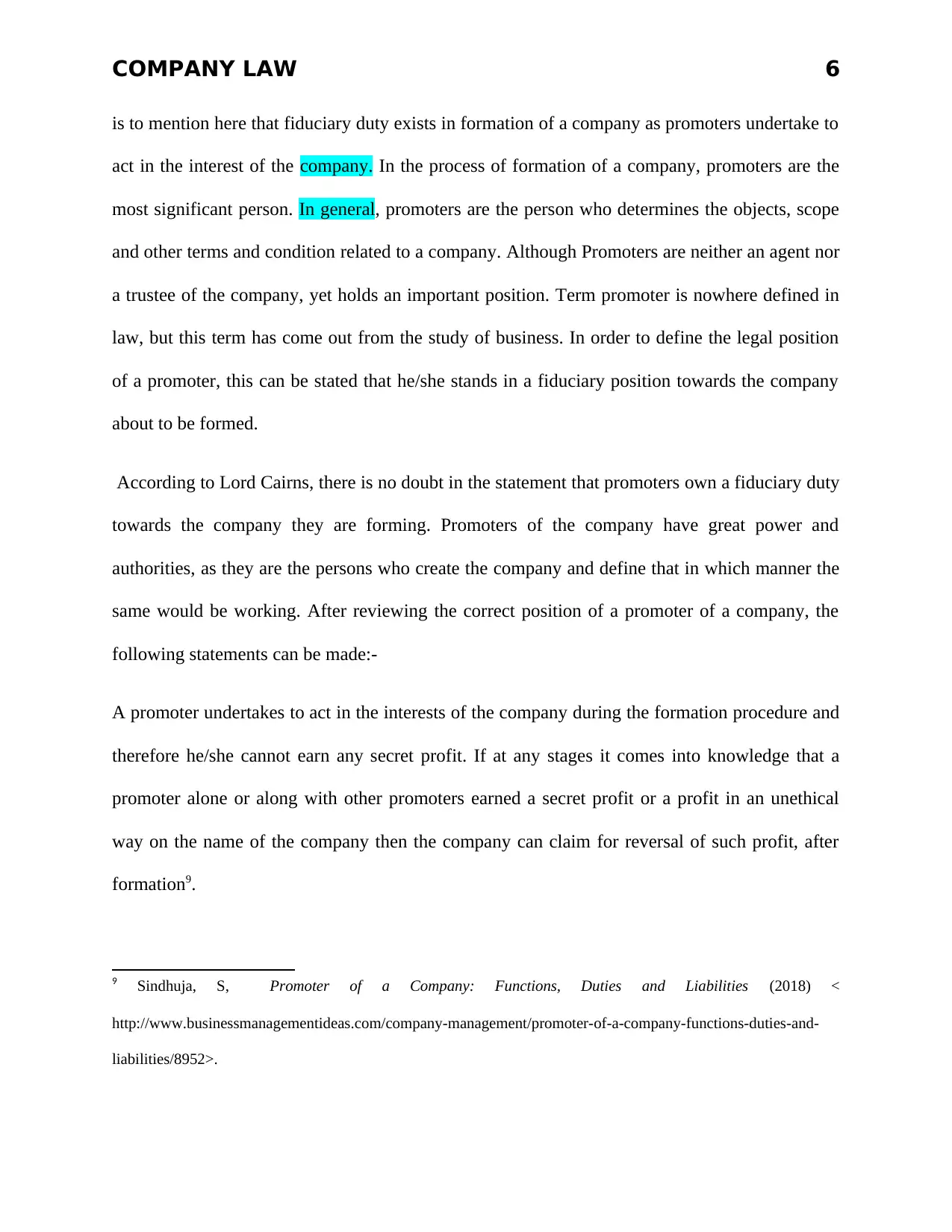
COMPANY LAW 6
is to mention here that fiduciary duty exists in formation of a company as promoters undertake to
act in the interest of the company. In the process of formation of a company, promoters are the
most significant person. In general, promoters are the person who determines the objects, scope
and other terms and condition related to a company. Although Promoters are neither an agent nor
a trustee of the company, yet holds an important position. Term promoter is nowhere defined in
law, but this term has come out from the study of business. In order to define the legal position
of a promoter, this can be stated that he/she stands in a fiduciary position towards the company
about to be formed.
According to Lord Cairns, there is no doubt in the statement that promoters own a fiduciary duty
towards the company they are forming. Promoters of the company have great power and
authorities, as they are the persons who create the company and define that in which manner the
same would be working. After reviewing the correct position of a promoter of a company, the
following statements can be made:-
A promoter undertakes to act in the interests of the company during the formation procedure and
therefore he/she cannot earn any secret profit. If at any stages it comes into knowledge that a
promoter alone or along with other promoters earned a secret profit or a profit in an unethical
way on the name of the company then the company can claim for reversal of such profit, after
formation9.
9 Sindhuja, S, Promoter of a Company: Functions, Duties and Liabilities (2018) <
http://www.businessmanagementideas.com/company-management/promoter-of-a-company-functions-duties-and-
liabilities/8952>.
is to mention here that fiduciary duty exists in formation of a company as promoters undertake to
act in the interest of the company. In the process of formation of a company, promoters are the
most significant person. In general, promoters are the person who determines the objects, scope
and other terms and condition related to a company. Although Promoters are neither an agent nor
a trustee of the company, yet holds an important position. Term promoter is nowhere defined in
law, but this term has come out from the study of business. In order to define the legal position
of a promoter, this can be stated that he/she stands in a fiduciary position towards the company
about to be formed.
According to Lord Cairns, there is no doubt in the statement that promoters own a fiduciary duty
towards the company they are forming. Promoters of the company have great power and
authorities, as they are the persons who create the company and define that in which manner the
same would be working. After reviewing the correct position of a promoter of a company, the
following statements can be made:-
A promoter undertakes to act in the interests of the company during the formation procedure and
therefore he/she cannot earn any secret profit. If at any stages it comes into knowledge that a
promoter alone or along with other promoters earned a secret profit or a profit in an unethical
way on the name of the company then the company can claim for reversal of such profit, after
formation9.
9 Sindhuja, S, Promoter of a Company: Functions, Duties and Liabilities (2018) <
http://www.businessmanagementideas.com/company-management/promoter-of-a-company-functions-duties-and-
liabilities/8952>.
Paraphrase This Document
Need a fresh take? Get an instant paraphrase of this document with our AI Paraphraser
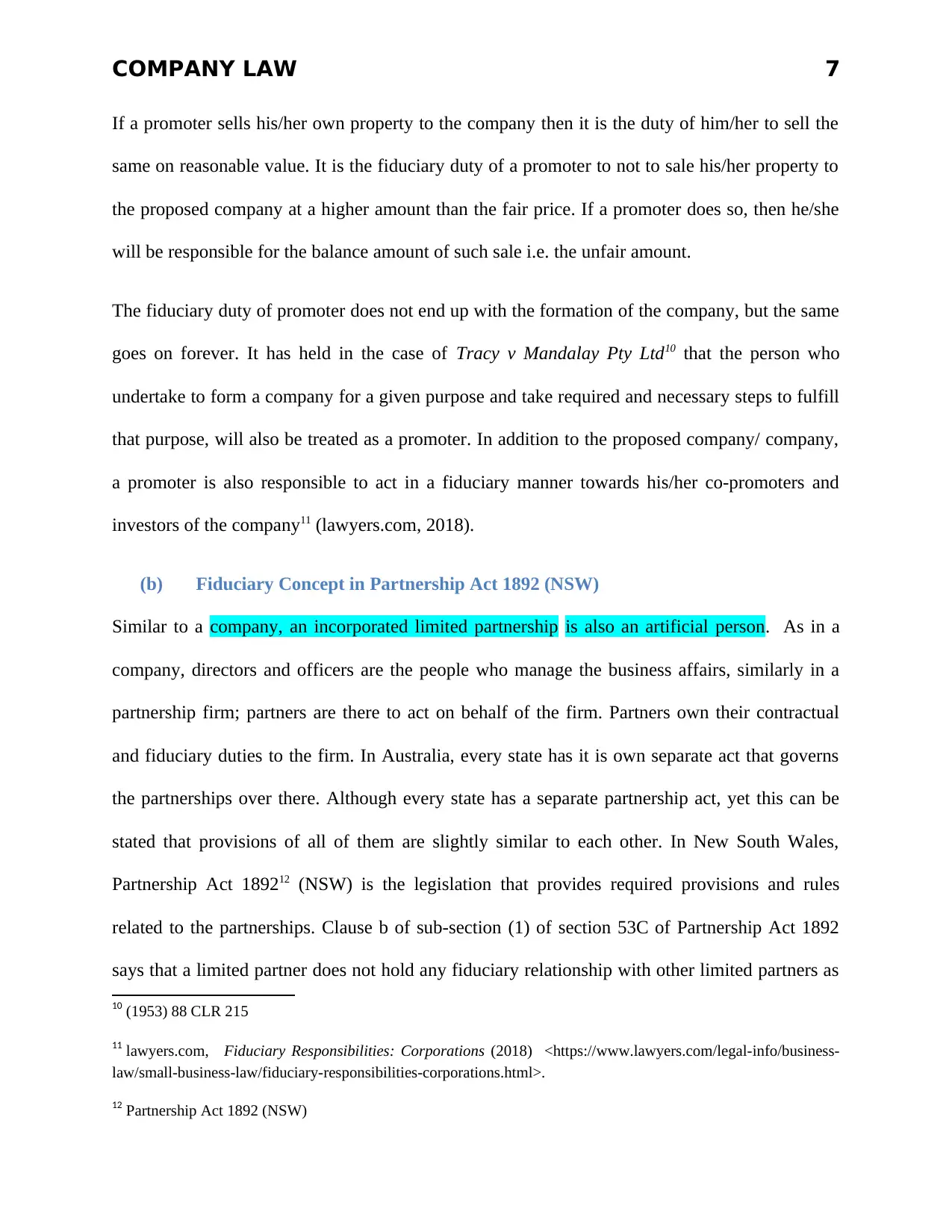
COMPANY LAW 7
If a promoter sells his/her own property to the company then it is the duty of him/her to sell the
same on reasonable value. It is the fiduciary duty of a promoter to not to sale his/her property to
the proposed company at a higher amount than the fair price. If a promoter does so, then he/she
will be responsible for the balance amount of such sale i.e. the unfair amount.
The fiduciary duty of promoter does not end up with the formation of the company, but the same
goes on forever. It has held in the case of Tracy v Mandalay Pty Ltd10 that the person who
undertake to form a company for a given purpose and take required and necessary steps to fulfill
that purpose, will also be treated as a promoter. In addition to the proposed company/ company,
a promoter is also responsible to act in a fiduciary manner towards his/her co-promoters and
investors of the company11 (lawyers.com, 2018).
(b) Fiduciary Concept in Partnership Act 1892 (NSW)
Similar to a company, an incorporated limited partnership is also an artificial person. As in a
company, directors and officers are the people who manage the business affairs, similarly in a
partnership firm; partners are there to act on behalf of the firm. Partners own their contractual
and fiduciary duties to the firm. In Australia, every state has it is own separate act that governs
the partnerships over there. Although every state has a separate partnership act, yet this can be
stated that provisions of all of them are slightly similar to each other. In New South Wales,
Partnership Act 189212 (NSW) is the legislation that provides required provisions and rules
related to the partnerships. Clause b of sub-section (1) of section 53C of Partnership Act 1892
says that a limited partner does not hold any fiduciary relationship with other limited partners as
10 (1953) 88 CLR 215
11 lawyers.com, Fiduciary Responsibilities: Corporations (2018) <https://www.lawyers.com/legal-info/business-
law/small-business-law/fiduciary-responsibilities-corporations.html>.
12 Partnership Act 1892 (NSW)
If a promoter sells his/her own property to the company then it is the duty of him/her to sell the
same on reasonable value. It is the fiduciary duty of a promoter to not to sale his/her property to
the proposed company at a higher amount than the fair price. If a promoter does so, then he/she
will be responsible for the balance amount of such sale i.e. the unfair amount.
The fiduciary duty of promoter does not end up with the formation of the company, but the same
goes on forever. It has held in the case of Tracy v Mandalay Pty Ltd10 that the person who
undertake to form a company for a given purpose and take required and necessary steps to fulfill
that purpose, will also be treated as a promoter. In addition to the proposed company/ company,
a promoter is also responsible to act in a fiduciary manner towards his/her co-promoters and
investors of the company11 (lawyers.com, 2018).
(b) Fiduciary Concept in Partnership Act 1892 (NSW)
Similar to a company, an incorporated limited partnership is also an artificial person. As in a
company, directors and officers are the people who manage the business affairs, similarly in a
partnership firm; partners are there to act on behalf of the firm. Partners own their contractual
and fiduciary duties to the firm. In Australia, every state has it is own separate act that governs
the partnerships over there. Although every state has a separate partnership act, yet this can be
stated that provisions of all of them are slightly similar to each other. In New South Wales,
Partnership Act 189212 (NSW) is the legislation that provides required provisions and rules
related to the partnerships. Clause b of sub-section (1) of section 53C of Partnership Act 1892
says that a limited partner does not hold any fiduciary relationship with other limited partners as
10 (1953) 88 CLR 215
11 lawyers.com, Fiduciary Responsibilities: Corporations (2018) <https://www.lawyers.com/legal-info/business-
law/small-business-law/fiduciary-responsibilities-corporations.html>.
12 Partnership Act 1892 (NSW)
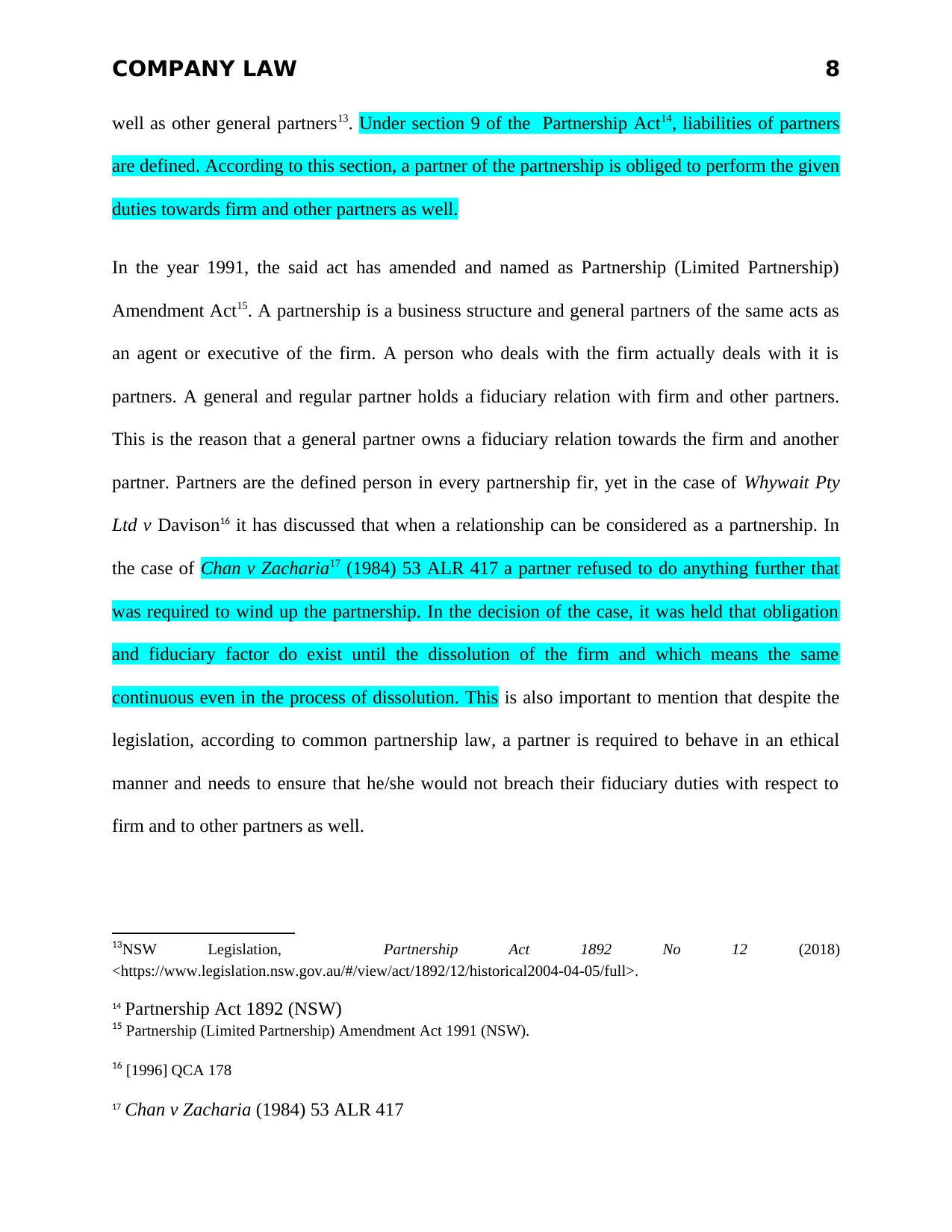
COMPANY LAW 8
well as other general partners13. Under section 9 of the Partnership Act14, liabilities of partners
are defined. According to this section, a partner of the partnership is obliged to perform the given
duties towards firm and other partners as well.
In the year 1991, the said act has amended and named as Partnership (Limited Partnership)
Amendment Act15. A partnership is a business structure and general partners of the same acts as
an agent or executive of the firm. A person who deals with the firm actually deals with it is
partners. A general and regular partner holds a fiduciary relation with firm and other partners.
This is the reason that a general partner owns a fiduciary relation towards the firm and another
partner. Partners are the defined person in every partnership fir, yet in the case of Whywait Pty
Ltd v Davison16 it has discussed that when a relationship can be considered as a partnership. In
the case of Chan v Zacharia17 (1984) 53 ALR 417 a partner refused to do anything further that
was required to wind up the partnership. In the decision of the case, it was held that obligation
and fiduciary factor do exist until the dissolution of the firm and which means the same
continuous even in the process of dissolution. This is also important to mention that despite the
legislation, according to common partnership law, a partner is required to behave in an ethical
manner and needs to ensure that he/she would not breach their fiduciary duties with respect to
firm and to other partners as well.
13NSW Legislation, Partnership Act 1892 No 12 (2018)
<https://www.legislation.nsw.gov.au/#/view/act/1892/12/historical2004-04-05/full>.
14 Partnership Act 1892 (NSW)
15 Partnership (Limited Partnership) Amendment Act 1991 (NSW).
16 [1996] QCA 178
17 Chan v Zacharia (1984) 53 ALR 417
well as other general partners13. Under section 9 of the Partnership Act14, liabilities of partners
are defined. According to this section, a partner of the partnership is obliged to perform the given
duties towards firm and other partners as well.
In the year 1991, the said act has amended and named as Partnership (Limited Partnership)
Amendment Act15. A partnership is a business structure and general partners of the same acts as
an agent or executive of the firm. A person who deals with the firm actually deals with it is
partners. A general and regular partner holds a fiduciary relation with firm and other partners.
This is the reason that a general partner owns a fiduciary relation towards the firm and another
partner. Partners are the defined person in every partnership fir, yet in the case of Whywait Pty
Ltd v Davison16 it has discussed that when a relationship can be considered as a partnership. In
the case of Chan v Zacharia17 (1984) 53 ALR 417 a partner refused to do anything further that
was required to wind up the partnership. In the decision of the case, it was held that obligation
and fiduciary factor do exist until the dissolution of the firm and which means the same
continuous even in the process of dissolution. This is also important to mention that despite the
legislation, according to common partnership law, a partner is required to behave in an ethical
manner and needs to ensure that he/she would not breach their fiduciary duties with respect to
firm and to other partners as well.
13NSW Legislation, Partnership Act 1892 No 12 (2018)
<https://www.legislation.nsw.gov.au/#/view/act/1892/12/historical2004-04-05/full>.
14 Partnership Act 1892 (NSW)
15 Partnership (Limited Partnership) Amendment Act 1991 (NSW).
16 [1996] QCA 178
17 Chan v Zacharia (1984) 53 ALR 417
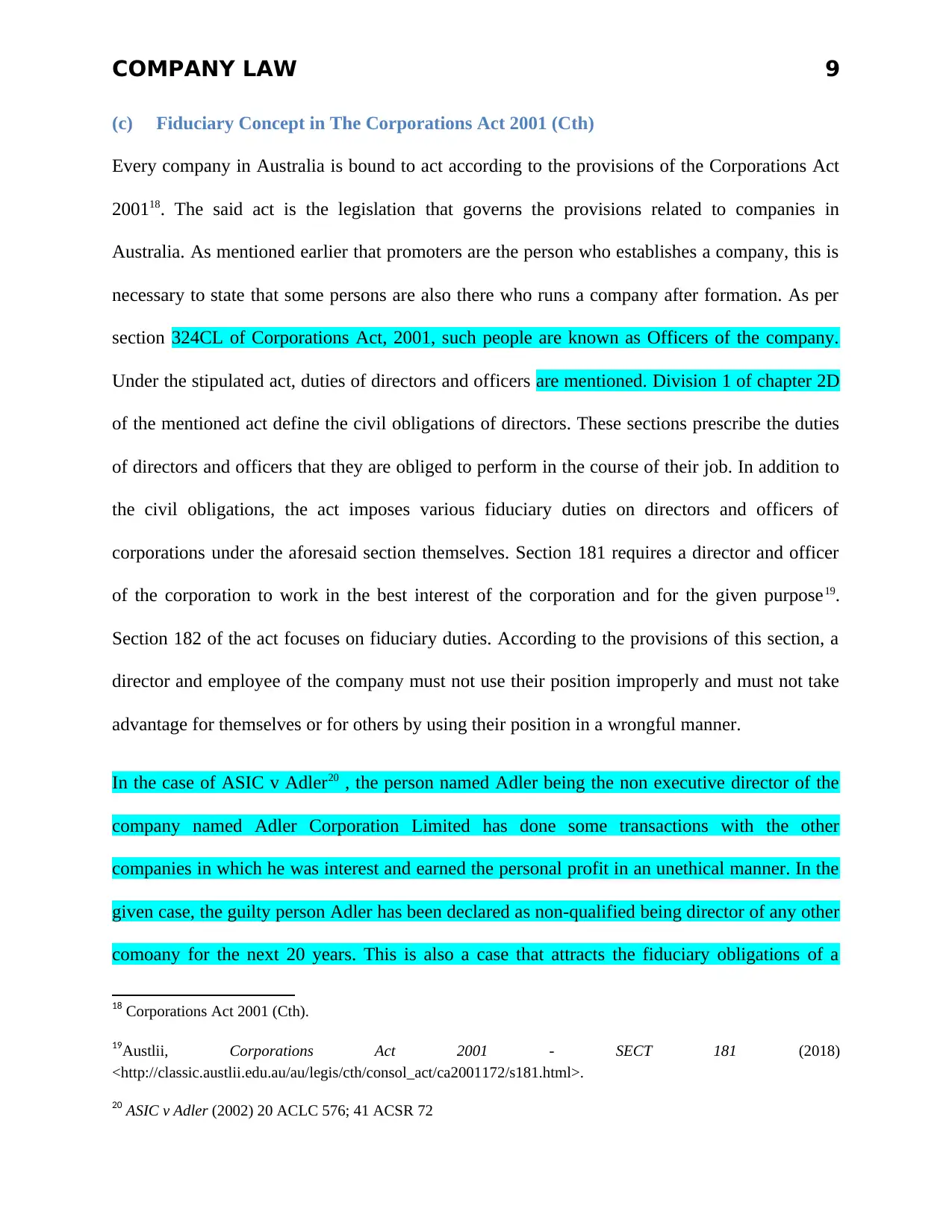
COMPANY LAW 9
(c) Fiduciary Concept in The Corporations Act 2001 (Cth)
Every company in Australia is bound to act according to the provisions of the Corporations Act
200118. The said act is the legislation that governs the provisions related to companies in
Australia. As mentioned earlier that promoters are the person who establishes a company, this is
necessary to state that some persons are also there who runs a company after formation. As per
section 324CL of Corporations Act, 2001, such people are known as Officers of the company.
Under the stipulated act, duties of directors and officers are mentioned. Division 1 of chapter 2D
of the mentioned act define the civil obligations of directors. These sections prescribe the duties
of directors and officers that they are obliged to perform in the course of their job. In addition to
the civil obligations, the act imposes various fiduciary duties on directors and officers of
corporations under the aforesaid section themselves. Section 181 requires a director and officer
of the corporation to work in the best interest of the corporation and for the given purpose19.
Section 182 of the act focuses on fiduciary duties. According to the provisions of this section, a
director and employee of the company must not use their position improperly and must not take
advantage for themselves or for others by using their position in a wrongful manner.
In the case of ASIC v Adler20 , the person named Adler being the non executive director of the
company named Adler Corporation Limited has done some transactions with the other
companies in which he was interest and earned the personal profit in an unethical manner. In the
given case, the guilty person Adler has been declared as non-qualified being director of any other
comoany for the next 20 years. This is also a case that attracts the fiduciary obligations of a
18 Corporations Act 2001 (Cth).
19Austlii, Corporations Act 2001 - SECT 181 (2018)
<http://classic.austlii.edu.au/au/legis/cth/consol_act/ca2001172/s181.html>.
20 ASIC v Adler (2002) 20 ACLC 576; 41 ACSR 72
(c) Fiduciary Concept in The Corporations Act 2001 (Cth)
Every company in Australia is bound to act according to the provisions of the Corporations Act
200118. The said act is the legislation that governs the provisions related to companies in
Australia. As mentioned earlier that promoters are the person who establishes a company, this is
necessary to state that some persons are also there who runs a company after formation. As per
section 324CL of Corporations Act, 2001, such people are known as Officers of the company.
Under the stipulated act, duties of directors and officers are mentioned. Division 1 of chapter 2D
of the mentioned act define the civil obligations of directors. These sections prescribe the duties
of directors and officers that they are obliged to perform in the course of their job. In addition to
the civil obligations, the act imposes various fiduciary duties on directors and officers of
corporations under the aforesaid section themselves. Section 181 requires a director and officer
of the corporation to work in the best interest of the corporation and for the given purpose19.
Section 182 of the act focuses on fiduciary duties. According to the provisions of this section, a
director and employee of the company must not use their position improperly and must not take
advantage for themselves or for others by using their position in a wrongful manner.
In the case of ASIC v Adler20 , the person named Adler being the non executive director of the
company named Adler Corporation Limited has done some transactions with the other
companies in which he was interest and earned the personal profit in an unethical manner. In the
given case, the guilty person Adler has been declared as non-qualified being director of any other
comoany for the next 20 years. This is also a case that attracts the fiduciary obligations of a
18 Corporations Act 2001 (Cth).
19Austlii, Corporations Act 2001 - SECT 181 (2018)
<http://classic.austlii.edu.au/au/legis/cth/consol_act/ca2001172/s181.html>.
20 ASIC v Adler (2002) 20 ACLC 576; 41 ACSR 72
Secure Best Marks with AI Grader
Need help grading? Try our AI Grader for instant feedback on your assignments.
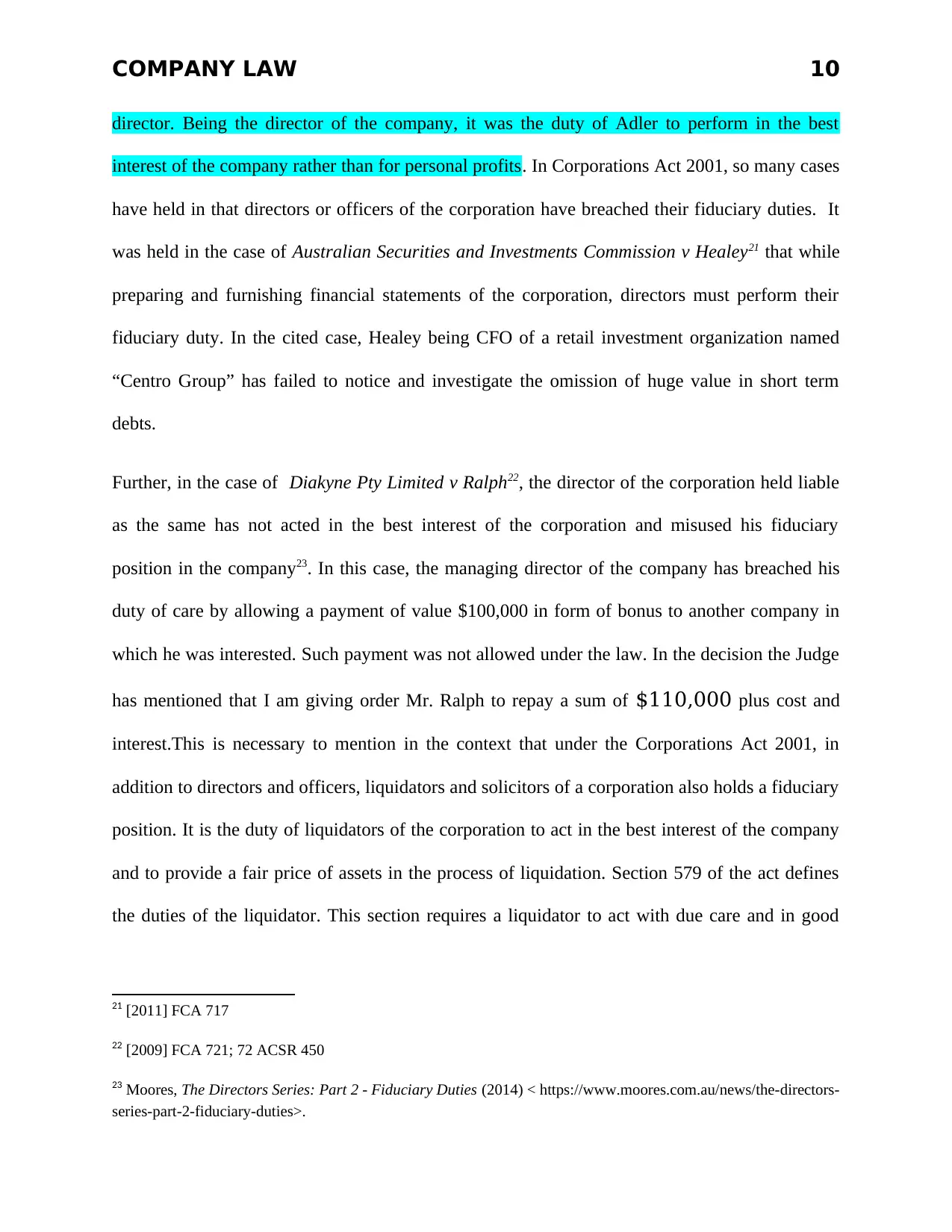
COMPANY LAW 10
director. Being the director of the company, it was the duty of Adler to perform in the best
interest of the company rather than for personal profits. In Corporations Act 2001, so many cases
have held in that directors or officers of the corporation have breached their fiduciary duties. It
was held in the case of Australian Securities and Investments Commission v Healey21 that while
preparing and furnishing financial statements of the corporation, directors must perform their
fiduciary duty. In the cited case, Healey being CFO of a retail investment organization named
“Centro Group” has failed to notice and investigate the omission of huge value in short term
debts.
Further, in the case of Diakyne Pty Limited v Ralph22, the director of the corporation held liable
as the same has not acted in the best interest of the corporation and misused his fiduciary
position in the company23. In this case, the managing director of the company has breached his
duty of care by allowing a payment of value $100,000 in form of bonus to another company in
which he was interested. Such payment was not allowed under the law. In the decision the Judge
has mentioned that I am giving order Mr. Ralph to repay a sum of $110,000 plus cost and
interest.This is necessary to mention in the context that under the Corporations Act 2001, in
addition to directors and officers, liquidators and solicitors of a corporation also holds a fiduciary
position. It is the duty of liquidators of the corporation to act in the best interest of the company
and to provide a fair price of assets in the process of liquidation. Section 579 of the act defines
the duties of the liquidator. This section requires a liquidator to act with due care and in good
21 [2011] FCA 717
22 [2009] FCA 721; 72 ACSR 450
23 Moores, The Directors Series: Part 2 - Fiduciary Duties (2014) < https://www.moores.com.au/news/the-directors-
series-part-2-fiduciary-duties>.
director. Being the director of the company, it was the duty of Adler to perform in the best
interest of the company rather than for personal profits. In Corporations Act 2001, so many cases
have held in that directors or officers of the corporation have breached their fiduciary duties. It
was held in the case of Australian Securities and Investments Commission v Healey21 that while
preparing and furnishing financial statements of the corporation, directors must perform their
fiduciary duty. In the cited case, Healey being CFO of a retail investment organization named
“Centro Group” has failed to notice and investigate the omission of huge value in short term
debts.
Further, in the case of Diakyne Pty Limited v Ralph22, the director of the corporation held liable
as the same has not acted in the best interest of the corporation and misused his fiduciary
position in the company23. In this case, the managing director of the company has breached his
duty of care by allowing a payment of value $100,000 in form of bonus to another company in
which he was interested. Such payment was not allowed under the law. In the decision the Judge
has mentioned that I am giving order Mr. Ralph to repay a sum of $110,000 plus cost and
interest.This is necessary to mention in the context that under the Corporations Act 2001, in
addition to directors and officers, liquidators and solicitors of a corporation also holds a fiduciary
position. It is the duty of liquidators of the corporation to act in the best interest of the company
and to provide a fair price of assets in the process of liquidation. Section 579 of the act defines
the duties of the liquidator. This section requires a liquidator to act with due care and in good
21 [2011] FCA 717
22 [2009] FCA 721; 72 ACSR 450
23 Moores, The Directors Series: Part 2 - Fiduciary Duties (2014) < https://www.moores.com.au/news/the-directors-
series-part-2-fiduciary-duties>.
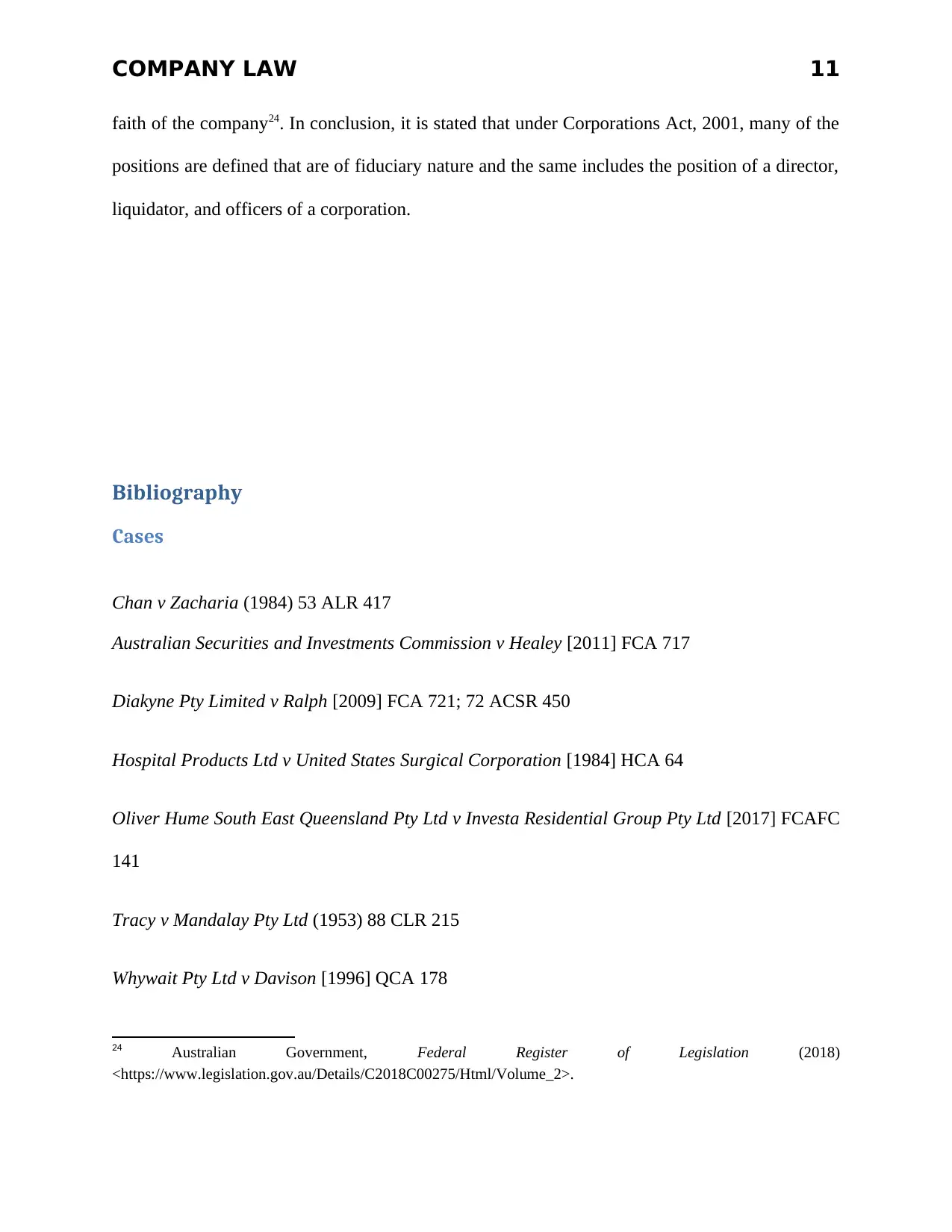
COMPANY LAW 11
faith of the company24. In conclusion, it is stated that under Corporations Act, 2001, many of the
positions are defined that are of fiduciary nature and the same includes the position of a director,
liquidator, and officers of a corporation.
Bibliography
Cases
Chan v Zacharia (1984) 53 ALR 417
Australian Securities and Investments Commission v Healey [2011] FCA 717
Diakyne Pty Limited v Ralph [2009] FCA 721; 72 ACSR 450
Hospital Products Ltd v United States Surgical Corporation [1984] HCA 64
Oliver Hume South East Queensland Pty Ltd v Investa Residential Group Pty Ltd [2017] FCAFC
141
Tracy v Mandalay Pty Ltd (1953) 88 CLR 215
Whywait Pty Ltd v Davison [1996] QCA 178
24 Australian Government, Federal Register of Legislation (2018)
<https://www.legislation.gov.au/Details/C2018C00275/Html/Volume_2>.
faith of the company24. In conclusion, it is stated that under Corporations Act, 2001, many of the
positions are defined that are of fiduciary nature and the same includes the position of a director,
liquidator, and officers of a corporation.
Bibliography
Cases
Chan v Zacharia (1984) 53 ALR 417
Australian Securities and Investments Commission v Healey [2011] FCA 717
Diakyne Pty Limited v Ralph [2009] FCA 721; 72 ACSR 450
Hospital Products Ltd v United States Surgical Corporation [1984] HCA 64
Oliver Hume South East Queensland Pty Ltd v Investa Residential Group Pty Ltd [2017] FCAFC
141
Tracy v Mandalay Pty Ltd (1953) 88 CLR 215
Whywait Pty Ltd v Davison [1996] QCA 178
24 Australian Government, Federal Register of Legislation (2018)
<https://www.legislation.gov.au/Details/C2018C00275/Html/Volume_2>.
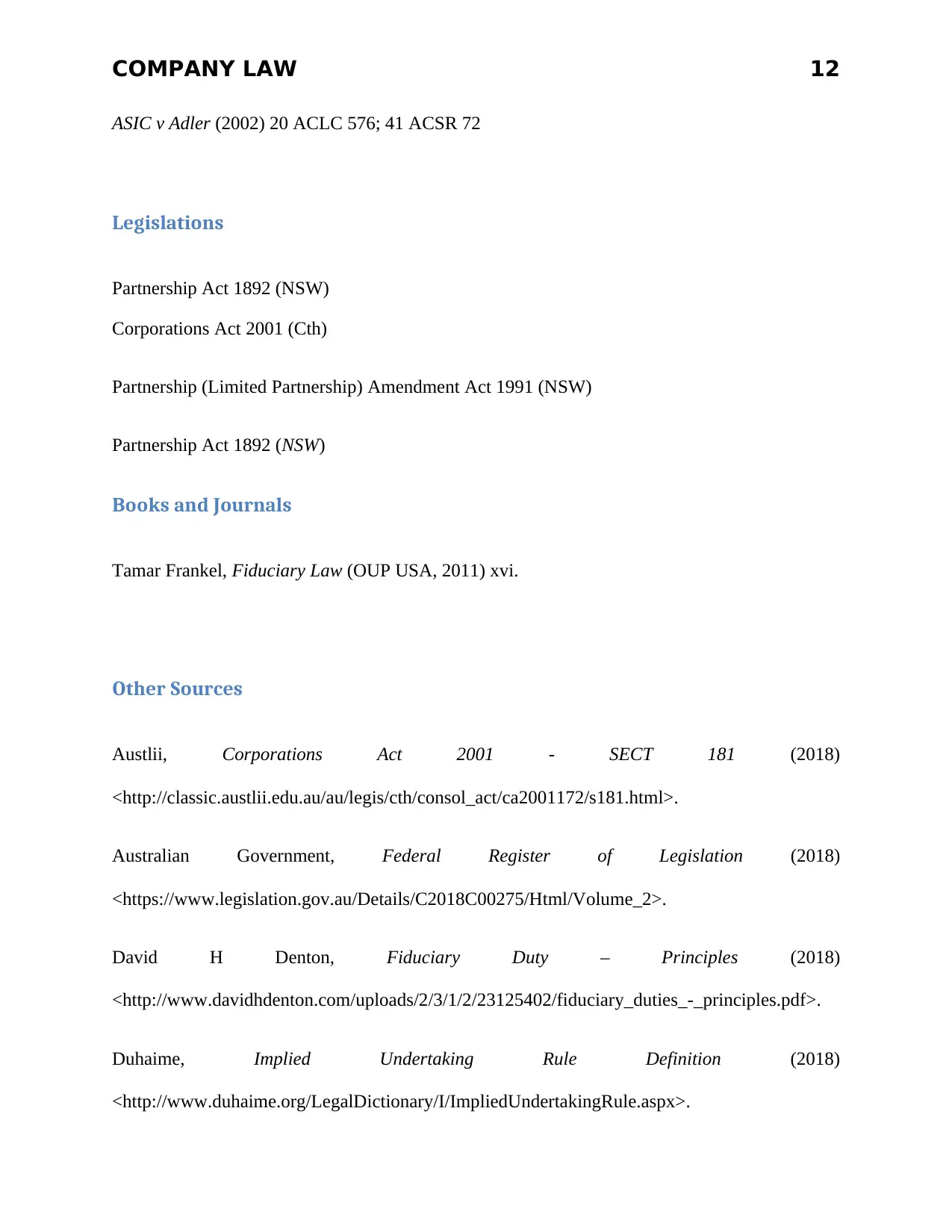
COMPANY LAW 12
ASIC v Adler (2002) 20 ACLC 576; 41 ACSR 72
Legislations
Partnership Act 1892 (NSW)
Corporations Act 2001 (Cth)
Partnership (Limited Partnership) Amendment Act 1991 (NSW)
Partnership Act 1892 (NSW)
Books and Journals
Tamar Frankel, Fiduciary Law (OUP USA, 2011) xvi.
Other Sources
Austlii, Corporations Act 2001 - SECT 181 (2018)
<http://classic.austlii.edu.au/au/legis/cth/consol_act/ca2001172/s181.html>.
Australian Government, Federal Register of Legislation (2018)
<https://www.legislation.gov.au/Details/C2018C00275/Html/Volume_2>.
David H Denton, Fiduciary Duty – Principles (2018)
<http://www.davidhdenton.com/uploads/2/3/1/2/23125402/fiduciary_duties_-_principles.pdf>.
Duhaime, Implied Undertaking Rule Definition (2018)
<http://www.duhaime.org/LegalDictionary/I/ImpliedUndertakingRule.aspx>.
ASIC v Adler (2002) 20 ACLC 576; 41 ACSR 72
Legislations
Partnership Act 1892 (NSW)
Corporations Act 2001 (Cth)
Partnership (Limited Partnership) Amendment Act 1991 (NSW)
Partnership Act 1892 (NSW)
Books and Journals
Tamar Frankel, Fiduciary Law (OUP USA, 2011) xvi.
Other Sources
Austlii, Corporations Act 2001 - SECT 181 (2018)
<http://classic.austlii.edu.au/au/legis/cth/consol_act/ca2001172/s181.html>.
Australian Government, Federal Register of Legislation (2018)
<https://www.legislation.gov.au/Details/C2018C00275/Html/Volume_2>.
David H Denton, Fiduciary Duty – Principles (2018)
<http://www.davidhdenton.com/uploads/2/3/1/2/23125402/fiduciary_duties_-_principles.pdf>.
Duhaime, Implied Undertaking Rule Definition (2018)
<http://www.duhaime.org/LegalDictionary/I/ImpliedUndertakingRule.aspx>.
Paraphrase This Document
Need a fresh take? Get an instant paraphrase of this document with our AI Paraphraser
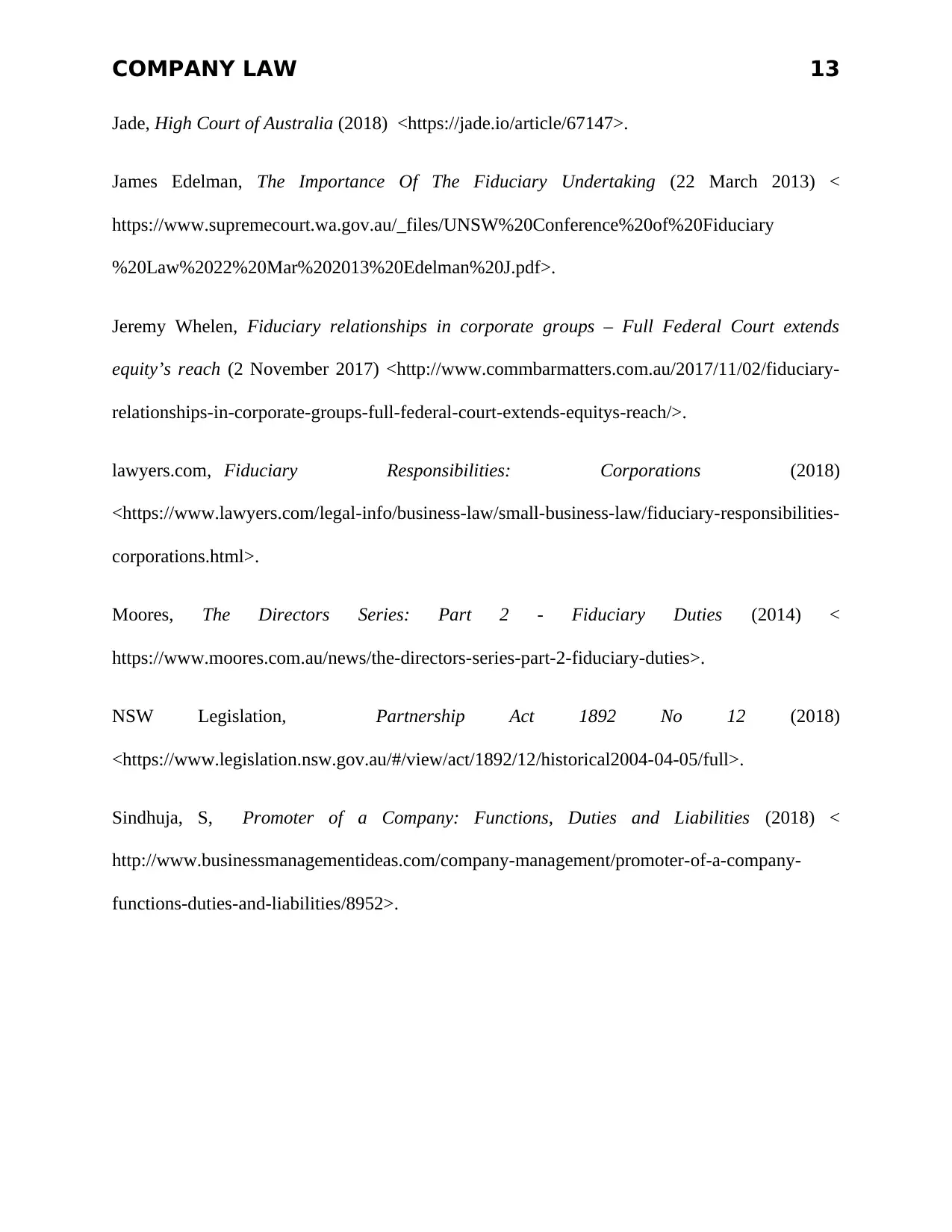
COMPANY LAW 13
Jade, High Court of Australia (2018) <https://jade.io/article/67147>.
James Edelman, The Importance Of The Fiduciary Undertaking (22 March 2013) <
https://www.supremecourt.wa.gov.au/_files/UNSW%20Conference%20of%20Fiduciary
%20Law%2022%20Mar%202013%20Edelman%20J.pdf>.
Jeremy Whelen, Fiduciary relationships in corporate groups – Full Federal Court extends
equity’s reach (2 November 2017) <http://www.commbarmatters.com.au/2017/11/02/fiduciary-
relationships-in-corporate-groups-full-federal-court-extends-equitys-reach/>.
lawyers.com, Fiduciary Responsibilities: Corporations (2018)
<https://www.lawyers.com/legal-info/business-law/small-business-law/fiduciary-responsibilities-
corporations.html>.
Moores, The Directors Series: Part 2 - Fiduciary Duties (2014) <
https://www.moores.com.au/news/the-directors-series-part-2-fiduciary-duties>.
NSW Legislation, Partnership Act 1892 No 12 (2018)
<https://www.legislation.nsw.gov.au/#/view/act/1892/12/historical2004-04-05/full>.
Sindhuja, S, Promoter of a Company: Functions, Duties and Liabilities (2018) <
http://www.businessmanagementideas.com/company-management/promoter-of-a-company-
functions-duties-and-liabilities/8952>.
Jade, High Court of Australia (2018) <https://jade.io/article/67147>.
James Edelman, The Importance Of The Fiduciary Undertaking (22 March 2013) <
https://www.supremecourt.wa.gov.au/_files/UNSW%20Conference%20of%20Fiduciary
%20Law%2022%20Mar%202013%20Edelman%20J.pdf>.
Jeremy Whelen, Fiduciary relationships in corporate groups – Full Federal Court extends
equity’s reach (2 November 2017) <http://www.commbarmatters.com.au/2017/11/02/fiduciary-
relationships-in-corporate-groups-full-federal-court-extends-equitys-reach/>.
lawyers.com, Fiduciary Responsibilities: Corporations (2018)
<https://www.lawyers.com/legal-info/business-law/small-business-law/fiduciary-responsibilities-
corporations.html>.
Moores, The Directors Series: Part 2 - Fiduciary Duties (2014) <
https://www.moores.com.au/news/the-directors-series-part-2-fiduciary-duties>.
NSW Legislation, Partnership Act 1892 No 12 (2018)
<https://www.legislation.nsw.gov.au/#/view/act/1892/12/historical2004-04-05/full>.
Sindhuja, S, Promoter of a Company: Functions, Duties and Liabilities (2018) <
http://www.businessmanagementideas.com/company-management/promoter-of-a-company-
functions-duties-and-liabilities/8952>.
1 out of 14
Related Documents
Your All-in-One AI-Powered Toolkit for Academic Success.
+13062052269
info@desklib.com
Available 24*7 on WhatsApp / Email
![[object Object]](/_next/static/media/star-bottom.7253800d.svg)
Unlock your academic potential
© 2024 | Zucol Services PVT LTD | All rights reserved.


